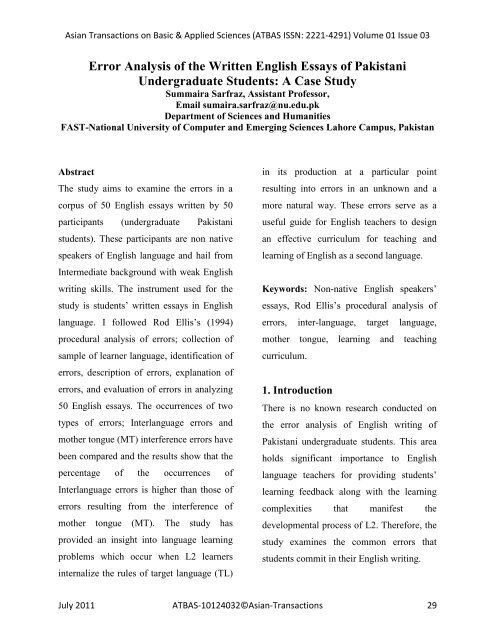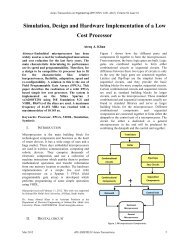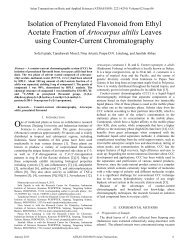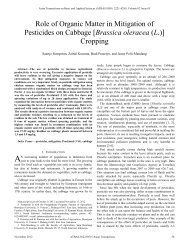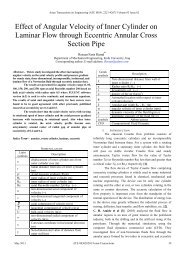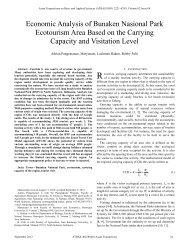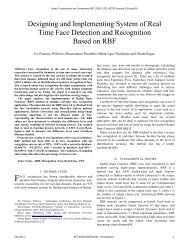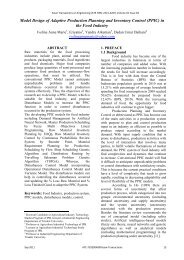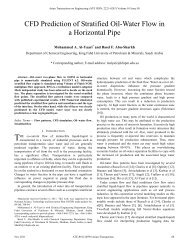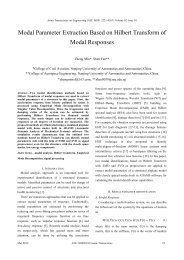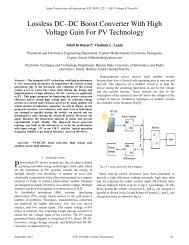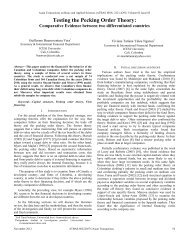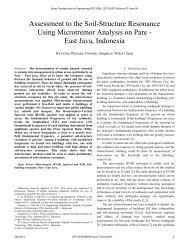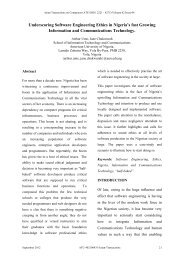Error Analysis of the Written English Essays of Pakistani ...
Error Analysis of the Written English Essays of Pakistani ...
Error Analysis of the Written English Essays of Pakistani ...
Create successful ePaper yourself
Turn your PDF publications into a flip-book with our unique Google optimized e-Paper software.
Asian Transactions on Basic & Applied Sciences (ATBAS ISSN: 2221-4291) Volume 01 Issue 03analysis has given a positive dimension toexamine errors, as“all language learning is based on continualexposure, hypo<strong>the</strong>sizing and, even with <strong>the</strong>correct hypo<strong>the</strong>sis, testing and reinforcing<strong>the</strong> ideas behind <strong>the</strong>m” (Bartholomae, 1980:97)[8].2. Literature Review<strong>Error</strong> <strong>Analysis</strong>(EA) is one <strong>of</strong> <strong>the</strong> mostinfluential <strong>the</strong>ories <strong>of</strong> second languageacquisition (SLA) which replaced <strong>the</strong>Contrastive <strong>Analysis</strong>(CA) <strong>the</strong>ory, whosemajor concern was “<strong>the</strong> comparison <strong>of</strong> twoor more languages or subsystems <strong>of</strong>languages in order to determine both <strong>the</strong>differences and similarities between <strong>the</strong>m”(Fisiak, 1981, p. 1) in 1970. CA regarded <strong>the</strong>influence <strong>of</strong> mo<strong>the</strong>r tongue (MT) on all <strong>the</strong>levels language; phonological,morphological, lexical and syntactic, insecond language acquisition. Due to <strong>the</strong>weaknesses <strong>of</strong> CA in its pedagogicalimplications, EA emerged as a moreeffective tool for in <strong>the</strong> study <strong>of</strong> secondlanguage acquisition. According to James,EA is “<strong>the</strong> study <strong>of</strong> linguistic ignorance, <strong>the</strong>investigation <strong>of</strong> what people do not knowand how <strong>the</strong>y attempt to cope with <strong>the</strong>irignorance” (James, 2001, p. 62) [14].The advocates <strong>of</strong> EA considered it importantto draw a distinction between mistake anderror, which are “technically two verydifferent phenomena” (Brown, 1994, p.205). Corder (1967) [7] took notion <strong>of</strong>Chomsky‟s “competence versusperformance” distinction relating errors t<strong>of</strong>ailures in competence and mistakes t<strong>of</strong>ailures in performance. According to thisnotion a mistake occurs not because <strong>of</strong> lack<strong>of</strong> competence but because <strong>of</strong> processinglimitations which indicates learner‟sinability in utilizing knowledge <strong>of</strong> TL. Anerror results an infringement <strong>of</strong> <strong>the</strong> rules <strong>of</strong>TL language and hence experience deviationin grammaticality <strong>of</strong> TL. <strong>Error</strong>s arisebecause <strong>of</strong> lack <strong>of</strong> competence. Nativespeaker can recognize and correct mistakes,but l2 learner need <strong>the</strong> linguistic competencyin TL to identify errors and correct <strong>the</strong>maccordingly.<strong>Error</strong> analysis focuses on <strong>the</strong> errors learnersmake by drawing a comparison between <strong>the</strong>errors made in (TL) and that TL itself. PitCorder in his article, “The significance <strong>of</strong>Learner <strong>Error</strong>s” (1967) [17] has given <strong>Error</strong><strong>Analysis</strong> a new dimension by answering to<strong>the</strong> question <strong>of</strong> L1 and L2 acquisitionprocess being <strong>the</strong> same or not.July 2011 ATBAS-10124032©Asian-Transactions 31
Asian Transactions on Basic & Applied Sciences (ATBAS ISSN: 2221-4291) Volume 01 Issue 03In 1972, Selinker (in Richards, 1974, p. 37)[24] put forward <strong>the</strong> following five sources<strong>of</strong> errors:1. Language transfer2. Transfer <strong>of</strong> training3. Strategies <strong>of</strong> second languagelearning4. Strategies <strong>of</strong> second languagecommunication, and5. Overgeneralization <strong>of</strong> TLlinguistic material.Researchers have been attaching a greatimportance to <strong>the</strong> social and cognitivefactors in <strong>the</strong> studies <strong>of</strong> sources <strong>of</strong> errors.Investigating social factors provide evidenceas to why some learners have better writingability than <strong>the</strong> o<strong>the</strong>rs and vise versa. Thisputs emphasis on <strong>the</strong> motivational aspect onlanguage learning. The goals, attitude andmotivation can why some learners preferpractice in <strong>the</strong>ir oral skills more thandeveloping writing skills.“Gardner‟s (1985) [11] socio-educationalmodel is designed to account for <strong>the</strong> role <strong>of</strong>social factors in language acquisition. Itinterrelates four aspects <strong>of</strong> L2 learning: <strong>the</strong>social and cultural milieu (which determinesbeliefs about language and culture),individual learner differences (related tomotivation and language aptitude), <strong>the</strong>setting (formal and/or informal learningcontexts), and learning outcomes.” (Myles,2002) The model emphasized that <strong>the</strong>motivational factors “probably do not makemuch difference on <strong>the</strong>ir own, but <strong>the</strong>y cancreate a more positive context in whichlanguage learning is likely to flourish"(Bialystok & Hakuta, 1994, p. 140).Information processing, in languageacquisition, is essentially a cognitiveactivity. Perceiving, input <strong>of</strong> newinformation, formulating, reorganizing, allbecome a part <strong>of</strong> information processing.One <strong>of</strong> <strong>the</strong> important cognitive factors insecond language acquisition is languagetransfer.Myles in her article “Second LanguageWriting and Research: The Writing Processand <strong>Error</strong> <strong>Analysis</strong> in Student Texts” gave<strong>the</strong> following views <strong>of</strong> different researcherson <strong>the</strong> Language Transfer:“Transfer is defined as <strong>the</strong> influenceresulting from similarities and differencesbetween <strong>the</strong> target language and any o<strong>the</strong>rlanguage that has been previously acquired(Odlin, 1989).July 2011 ATBAS-10124032©Asian-Transactions 33
Asian Transactions on Basic & Applied Sciences (ATBAS ISSN: 2221-4291) Volume 01 Issue 03“The study <strong>of</strong> transfer involves <strong>the</strong> study <strong>of</strong>errors (negative transfer), facilitation(positive transfer), avoidance <strong>of</strong> targetlanguage forms, and <strong>the</strong>ir over-use (Ellis,1994).”“Behaviorist accounts claim that transfer is<strong>the</strong> cause <strong>of</strong> errors, whereas from a cognitiveperspective, transfer is seen as a resourcethat <strong>the</strong> learner actively draws upon ininterlanguage development (Selinker,1972).” [3]“In o<strong>the</strong>r words, "<strong>the</strong> L1 can have a directeffect on interlanguage development byinfluencing <strong>the</strong> hypo<strong>the</strong>ses that learnersconstruct" (Ellis, 1994, p. 342).“According to McLaughlin, transfer errorscan occur because:[L]earners lack <strong>the</strong> necessaryinformation in <strong>the</strong> second languageor <strong>the</strong> attentional capacity to activate<strong>the</strong> appropriate second-languageroutine. But such an account sayslittle about why certain linguisticforms transfer and o<strong>the</strong>rs do not.(1988, p. 50).”Efforts are being made by non native<strong>English</strong> language teachers to study <strong>the</strong>patterns in <strong>the</strong> writing errors <strong>of</strong> non nativespeakers <strong>of</strong> <strong>English</strong> language to investigate<strong>the</strong> learning problems so to design aneffective teaching material. Darus andSubramaniam (2009) in “<strong>Error</strong> <strong>Analysis</strong> <strong>of</strong><strong>the</strong> <strong>Written</strong> <strong>English</strong> <strong>Essays</strong> <strong>of</strong> SecondarySchool Students in Malaysia: A CaseStudy,” made an attempt to “identify,describe, categorize, and diagnose <strong>the</strong> errorsin <strong>English</strong> essay writing <strong>of</strong> <strong>the</strong> Arabicspeaking Brevet students,” and concludedthat “only one-third <strong>of</strong> <strong>the</strong> second languagelearner‟s errors can be attributed to NLlanguage transfer, this is what this studycame up with. Most <strong>of</strong> <strong>the</strong> errors are causedby an over application <strong>of</strong> L2. We do need toincite our students to speak <strong>English</strong> at homeand with <strong>the</strong>ir friends in order to reduce <strong>the</strong>number <strong>of</strong> mistakes due to Negative L1transfer, but we also need to try to teachmore effectively <strong>the</strong> rules and conventions<strong>of</strong> writing.”3. MethodologyThe procedural analysis <strong>of</strong> Ellis (1994) <strong>of</strong><strong>Error</strong> <strong>Analysis</strong> is followed in <strong>the</strong> study. Theprocedure has <strong>the</strong> following steps:1. Collection <strong>of</strong> sample <strong>of</strong> learnerlanguage: <strong>Written</strong> sample essays2. Identification <strong>of</strong> errors: Actual3. Description <strong>of</strong> errors4. Evaluation <strong>of</strong> errors.3.1. ParticipantsJuly 2011 ATBAS-10124032©Asian-Transactions 34
Asian Transactions on Basic & Applied Sciences (ATBAS ISSN: 2221-4291) Volume 01 Issue 03The participants <strong>of</strong> <strong>the</strong> study are <strong>the</strong> 50undergraduate students <strong>of</strong> FAST NationalUniversity. They are registered in <strong>the</strong><strong>English</strong> Writing Composition course whichis <strong>the</strong> second semester course <strong>of</strong> <strong>the</strong>irComputer Science degree program. Theyhave taken <strong>the</strong> Basic <strong>English</strong> languagecourse in <strong>the</strong>ir first semester, which has aseven week <strong>of</strong> <strong>English</strong> writing module.All <strong>the</strong> participants come from <strong>the</strong>Intermediate background where <strong>English</strong> istaught as a subject course, hence <strong>the</strong>ir weak<strong>English</strong> language pr<strong>of</strong>iciency.3.2. InstrumentThe instrument used in <strong>the</strong> study is essayswritten by 50 participants. The topic givenin <strong>the</strong> essays was general but argumentativein nature. The participants were required tonarrow it down to more specific one in orderto develop <strong>the</strong> argument in 300-350 words.It was a guided activity as <strong>the</strong> participantswere to follow <strong>the</strong> proper structure <strong>of</strong> anessay; interesting opening, <strong>the</strong>sis statement,logically coherent main body and relevantconclusion. The composition and expression<strong>of</strong> ideas were expected to be grammaticallycorrect along with correct spellings. Ichecked all <strong>the</strong> 50 essays and collected <strong>the</strong>errors for <strong>the</strong> study.3.3. Data <strong>of</strong> <strong>Error</strong>sI organized <strong>the</strong> data <strong>of</strong> errors according to<strong>the</strong> following steps:1. Collection <strong>of</strong> sample <strong>of</strong> learnerlanguage: <strong>English</strong> essays written bynon native undergraduate students.2. Identification <strong>of</strong> errors: Actual errors3. Description <strong>of</strong> errors: Categorization<strong>of</strong> errors based on <strong>the</strong>ir specificnature4. Evaluation <strong>of</strong> errors: Affectingintelligibility <strong>of</strong> social acceptability.Table1. <strong>Error</strong> <strong>Analysis</strong> <strong>of</strong> 50 <strong>Essays</strong> (Annexure I)Identification Description Explanation EvaluationWe people Literal translation We or we as a nationExp: Literaltranslation <strong>of</strong> <strong>the</strong>words “hum log” from<strong>the</strong> Urdu language<strong>Error</strong> does not affectsintelligibility andsocial acceptabilityJuly 2011 ATBAS-10124032©Asian-Transactions 35
Asian Transactions on Basic & Applied Sciences (ATBAS ISSN: 2221-4291) Volume 01 Issue 03<strong>of</strong> “definately” <strong>the</strong> L2 learner spelt <strong>the</strong>word as spoken in day to day conversationwith influence <strong>of</strong> [ eI] sound <strong>of</strong> MT instead<strong>of</strong> [I] sound <strong>of</strong> <strong>the</strong> underlined phone : def-inite-ly.The Interlanguage errors in <strong>the</strong> study haveprovided evidence <strong>of</strong> <strong>the</strong> inner working <strong>of</strong><strong>the</strong> language learning process, and <strong>the</strong>language in use having an intermediatestatus between <strong>the</strong> mo<strong>the</strong>r tongue (MT) and<strong>the</strong> target language (TL). The application <strong>of</strong><strong>the</strong> transitional rules has resulted into <strong>the</strong>systematic deviation from <strong>the</strong> TL. Theparticipants‟ previous experience <strong>of</strong>exposure to <strong>English</strong> language was mostlyconfined to classroom only where <strong>the</strong><strong>English</strong> was taught through grammartranslation method. The participants weretaught <strong>the</strong> rules <strong>of</strong> grammar first and wereprovided with insufficient learningenvironment to practice those rules. Theparticipants feel a huge gap between <strong>the</strong>knowledge <strong>of</strong> L2 that <strong>the</strong>y have and itsrelevant application. The errors which showredundancy e.g. “Poor people are becomingpoor and more poor,” and affectintelligibility indicate lack <strong>of</strong> vocabularyand <strong>the</strong> overgeneralization <strong>of</strong> rules <strong>of</strong> TL. In<strong>the</strong> absence <strong>of</strong> sufficient practice, <strong>the</strong>learners produce <strong>the</strong> language system whichdeviates from <strong>the</strong> system <strong>of</strong> TL.There are some errors which, although, areerrors by all technical definition but still<strong>the</strong>y nei<strong>the</strong>r affect <strong>the</strong> intelligibility nor <strong>the</strong>social acceptability <strong>of</strong> an addressee in ourculture. For example, “we people,” is anerror which is very common among L2learners as it occurs mostly because <strong>of</strong> MT(Urdu) interference, but <strong>the</strong> occurrences <strong>of</strong>such errors are so common in our culturethat <strong>the</strong>y tend to be overlooked. Thistendency <strong>of</strong> overlooking an error whichbecomes acceptable due to its ability <strong>of</strong>being able to convey <strong>the</strong> intended meaningin a particular culture, can lead t<strong>of</strong>ossilization. Fossilized errors in writingbecome ingrained and despite correction andremediation <strong>the</strong>y reappear.Among <strong>the</strong> errors collected from <strong>the</strong> essays,one unique error has been indentified whichwill likely to open new areas <strong>of</strong> research inerror analysis <strong>of</strong> <strong>English</strong> writing <strong>of</strong> nonnative speakers. One <strong>of</strong> <strong>the</strong> participantswrote “lyfe,” and “fite,” in <strong>the</strong> essay andlater on in <strong>the</strong> same essay <strong>the</strong>se misspelledwords appeared with <strong>the</strong> correct spellings;“life,” and “fight.” These days, <strong>the</strong> reducedspelled words are heavily used in shortJuly 2011 ATBAS-10124032©Asian-Transactions 37
Asian Transactions on Basic & Applied Sciences (ATBAS ISSN: 2221-4291) Volume 01 Issue 03message service (SMS) and online chat.This shows <strong>the</strong> negative influence <strong>of</strong> <strong>the</strong>sestechnologies especially on L2 learners whoare committing unwanted errors despitehaving <strong>the</strong> right understanding <strong>of</strong> o<strong>the</strong>rwisea limited knowledge <strong>of</strong> rules <strong>of</strong> TL.ConclusionThe results <strong>of</strong> <strong>the</strong> study show that majority<strong>of</strong> errors are grammatical resulting fromInterlanguage process. Though, <strong>the</strong>participants were taught grammatical rules<strong>of</strong> TL previously but <strong>the</strong> lack <strong>of</strong> practice andpositive feedback hindered <strong>the</strong> development<strong>of</strong> <strong>the</strong>ir pr<strong>of</strong>iciency in TL. <strong>Error</strong>s projectingredundancy show <strong>the</strong> lack <strong>of</strong> TL lexicon.Some <strong>of</strong> <strong>the</strong> errors indicate participants‟carelessness in <strong>the</strong> writing which shows lack<strong>of</strong> motivation for TL. This is a very commonphenomenon that L2 learner <strong>of</strong>ten feelsdemotivated and develop negative attitudetowards <strong>the</strong> target language. It results fromteachers‟ traditional role <strong>of</strong> overly correcting<strong>the</strong> errors and treating <strong>the</strong>m as an object <strong>of</strong>undesirability. Ano<strong>the</strong>r reason fordemoralization is that since acquisition <strong>of</strong> alanguage is a cognitive activity, <strong>of</strong>ten L2learners in our culture feel a psychologicaldistance between <strong>the</strong>m and <strong>the</strong> targetculture.In Pakistan, language community <strong>of</strong> nonnativespeakers <strong>of</strong> <strong>English</strong> language, peoplemostly ignore <strong>the</strong> repeated errors, ra<strong>the</strong>r dueto lack <strong>of</strong> linguistic competence, <strong>the</strong>y aresometime unable to identify <strong>the</strong>m as errors.This frequently leads to <strong>the</strong> socialacceptance <strong>of</strong> an error. These errors caninitiate fur<strong>the</strong>r research into <strong>the</strong> error studiesabout <strong>the</strong> possibility <strong>of</strong> fossilization <strong>of</strong> sucherrors or at one point <strong>of</strong> being ceased to beconsidered as errors at all in <strong>the</strong> <strong>Pakistani</strong><strong>English</strong> language context.Ano<strong>the</strong>r area for potential research is toexamine <strong>the</strong> errors caused by <strong>the</strong> influence<strong>of</strong> internet communication and SMStechnology and propose mechanism foraddressing <strong>the</strong> issue.<strong>Error</strong> <strong>Analysis</strong> can help <strong>the</strong> <strong>English</strong>language teachers to identify <strong>the</strong>problematic areas <strong>of</strong> language learning byproviding a deep insight into learner‟ssecond language acquisition process. Bystudying <strong>the</strong> changes that occur in <strong>the</strong> errors<strong>of</strong> L2 learners in <strong>the</strong>ir continuous learningprocess, <strong>the</strong> teachers can predict <strong>the</strong> likelyerrors and can prepare <strong>the</strong>ir instructionalmaterial accordingly.July 2011 ATBAS-10124032©Asian-Transactions 38
Asian Transactions on Basic & Applied Sciences (ATBAS ISSN: 2221-4291) Volume 01 Issue 03References[1] Ferris, D. (2002). Treatment <strong>of</strong> error insecond language student writing. AnnArbor:University <strong>of</strong> Michigan Press.[2] Mitchell, R. and Myles, M. (2004).Second language learning <strong>the</strong>ories. NewYork: HodderArnold.[3] Olasehinde, M. O. (2002). <strong>Error</strong> analysisand remedial pedagogy. In Babatunde S. T.and D.Selinker, L. (1972). Interlanguage.International Review <strong>of</strong> Applied Linguistics,10, 209-231.[4] Sercombe, P. G. (2000). Learnerlanguage and <strong>the</strong> consideration <strong>of</strong>idiosyncracies by students<strong>of</strong> <strong>English</strong> as a second or foreign languagein <strong>the</strong> context <strong>of</strong> Brunei Darulsalam. InA.M.[5] Noor et al. (eds.) Strategising teachingand learning in <strong>the</strong> 21st century.Proceedings <strong>of</strong> <strong>the</strong>European Journal <strong>of</strong> Social Sciences –Volume 8, Number 3 (2009)495[6] James, C. (1988). <strong>Error</strong>s in languagelearning and use: Exploring error analysis.Harlow,Essex: Addison Wesley Longman Limited.[7] Corder, S. P. (1967). The significance <strong>of</strong>learners‟ errors. International Review <strong>of</strong>AppliedLinguistics, 5(4), 161-169.[8] Bartholomae, D. (1980). Study <strong>of</strong> error.College Composition and Communication,31, 253-269.[9] Cumming, A. (1995). Fostering writingexpertise in ESL composition instruction:Modeling and evaluation. In D. Belcher &G. Braine (Eds.), Academic writing in asecond language (pp. 375-397). Norwood,NJ: Ablex Publishing Co.[10] Ellis, R. (1985). Understanding secondlanguage acquisition. Oxford: PergamonInstitute <strong>of</strong> <strong>English</strong>.[11] Gardner, R. (1985). Social psychologyand second language learning: The role <strong>of</strong>attitude and motivation. London: EdwardArnold[12] Richards, J. C. 1971. A Non-contrastiveapproach to error analysis. <strong>English</strong>Language Teaching Journal, 25, 204-219.[13] Lee, I. (1997). ESL Learners'performance in error correction in writing:Some implications for teaching. System, 15,465-477.[14] James, C. 2001. <strong>Error</strong>s in languagelearning and use: Exploring error analysis.Beijing: Foreign Language Teaching andResearch Press.July 2011 ATBAS-10124032©Asian-Transactions 39
Asian Transactions on Basic & Applied Sciences (ATBAS ISSN: 2221-4291) Volume 01 Issue 03[15] Schachter, J. 1974. An error in erroranalysis. Language Learning, 24, 205-214.Selinker, L. 1972. Interlanguage.International Journal <strong>of</strong> Applied Linguistics,10, 209-231.[16] DAI Wei-dong, SHU Ding-fang. 1994.Some research issues in contrastiveanalysis, error analysis and interlanguage.Journal <strong>of</strong> ForeignLanguages, 5, 1-7.[17] Corder, S. P. 1967. The significance <strong>of</strong>learner‟s errors. International Review <strong>of</strong>Applied Linguistics, 5, 161-170.[18] Spolsky, B. 1989. Conditions forsecond language learning. Oxford: OxfordUniversity Press.[19] Nemser, W. 1971. Approximativesystems <strong>of</strong> foreign language learners.International Journal <strong>of</strong> Applied Linguistics,9, 115-123.[20] American students in secondary schooland university.Journal <strong>of</strong> Second LanguageWriting, 2, 149-172.[21] Tierney, R. J., & Mosenthal, J. H.(1983). Cohesion andtextual coherence.Research in <strong>the</strong> Teaching <strong>of</strong> <strong>English</strong>,[22] Sasaki, M. (2000). Toward an empiricalmodel <strong>of</strong> EFL writing processes. Journal <strong>of</strong>Second Language Writing,9(3), 259-291.[23] Ramanathan, V., & Kaplan, R. B.(2000). Genres, authors, discoursecommunities: Theory and application for(L1and) L2 writing instruction. Journal <strong>of</strong>Second Language Writing, 9, 171-191.[24] Selinker, L. 1992. Rediscoveringinterlanguage. London: Longman GroupU.K. Limited, Essex.July 2011 ATBAS-10124032©Asian-Transactions 40
Asian Transactions on Basic & Applied Sciences (ATBAS ISSN: 2221-4291) Volume 01 Issue 03Annexure IUnsincere Word usage InsincereExp: The word used doesnot exist in <strong>the</strong>dictionaryYear‟s (years),Leader‟s (leaders)Effect‟s (effects)Politic‟s (politics)PunctuationYearsLeadersEffectsPoliticsExp: Use <strong>of</strong> apostrophewherever an „s‟ hasaddedOurselfs/ourselve Singular/plural OurselvesExp: The word used doesnot exist in <strong>the</strong>dictionaryPoor people arebecoming poor andmore poorWord orderPoor people arebecoming more andmore poorExp: The sentence needsto be rearrangede.t.c Punctuation etc.Exp: Use <strong>of</strong> full stop inbetweenFiteLyfSpelling mistakeFightLifeExp: The words havebeen spelt <strong>the</strong> way <strong>the</strong>ysoundMughals Article The MughalsExp: Use <strong>of</strong> <strong>the</strong> withproper nounUnderdeveloped Word usage DevelopingExp: An outdated termThere/<strong>the</strong>ir Differentiation There you goTheir houseExp: Troubledifferentiating <strong>the</strong> twoaccording to <strong>the</strong>irmeaningDefinatelyPhilosiphyCritariaSpelling mistakeDefinitelyPhilosophyCriteriaExp: The words aremispronounced veryfrequently MT influenceas a result <strong>of</strong> which <strong>the</strong>yhave been speltaccordinglyGoverment Spelling mistake GovernmentExp: „N‟ is silent when<strong>the</strong> word is said out loud<strong>Error</strong> affectsintelligibility<strong>Error</strong> affectsintelligibility<strong>Error</strong> affectsintelligibility<strong>Error</strong> affectsintelligibility and socialacceptance<strong>Error</strong> affectsintelligibility<strong>Error</strong> affectsintelligibility and socialacceptability<strong>Error</strong> does not affectsintelligibility and socialacceptability<strong>Error</strong> does not affectsintelligibility and socialacceptability<strong>Error</strong> affectsintelligibility<strong>Error</strong> affectsintelligibility<strong>Error</strong> affectsintelligibilityGovt. Abbreviation Government <strong>Error</strong> affectsJuly 2011 ATBAS-10124032©Asian-Transactions 41
Asian Transactions on Basic & Applied Sciences (ATBAS ISSN: 2221-4291) Volume 01 Issue 03Exp: Unnecessaryabbreviations in formalwritingIt‟s/its Differentiation If it‟s possibleThe cat and its tailExp: Problem telling <strong>the</strong>same sounding wordsapartwhen It Capital letter When itExp: The first letter <strong>of</strong><strong>the</strong> sentence is smallwhereas <strong>the</strong> second wordbegins with a capitalletterTheir lives is become Subject-verb agreement Their lives have becomeExp: Plural nounwhereas <strong>the</strong> verb used isone that should havebeen used with a singularnounPatriarky Spelling mistake PatriarchyExp: The word has beenspelt exactly like itsounds out loudSucide Spelling mistake SuicideExp: Mispronunciationleading to spellingHe is member <strong>of</strong> thissocietyArticlemistakeHe is a member <strong>of</strong> thissocietyExp: The word „he‟shows that it‟s singularso an article is requiredin <strong>the</strong> sentenceRo<strong>of</strong> on your head Preposition Ro<strong>of</strong> over your headExp: The incorrect use <strong>of</strong>preposition here caneasily cause confusionand mislead <strong>the</strong> readerWhat do a student do Subject-verb agreement What does a student doExp: The verb used isnei<strong>the</strong>r suitable for <strong>the</strong>article that has been usednor for a singular nounFavourtism Spelling mistake FavoritismExp: Most probablymispronunciation led tothis mistakeHamppers Spelling mistake HampersExp: Mispronunciationdue to a heavy accentand lack <strong>of</strong> knowledge <strong>of</strong>syllables can lead to thiskind <strong>of</strong> a mistakeintelligibility<strong>Error</strong> affectsintelligibility<strong>Error</strong> affectsintelligibility<strong>Error</strong> affectsintelligibility and socialacceptability<strong>Error</strong> affectsintelligibility and socialacceptability<strong>Error</strong> affectsintelligibility and socialacceptability<strong>Error</strong> affectsintelligibility<strong>Error</strong> affectsintelligibility<strong>Error</strong> affectsintelligibility<strong>Error</strong> affectsintelligibility<strong>Error</strong> affectsintelligibilityCigret Spelling mistake Cigarette <strong>Error</strong> affectsJuly 2011 ATBAS-10124032©Asian-Transactions 42
Asian Transactions on Basic & Applied Sciences (ATBAS ISSN: 2221-4291) Volume 01 Issue 03Exp: Mispronunciationcan easily lead to such amistakeQuaid-e-azam/Punjab Article The Quiad-e-azamThe PunjabExp: It‟s not a name buta title given because <strong>of</strong>certain attributes e.g.The Red KingDont Punctuation Don‟tExp: Apostrophe hasbeen missed outDoes‟nt Punctuation Doesn‟tExp: An apostropheshould have been usedwhere <strong>the</strong> vowel/letterhas been droppedNegetive Spelling mistake NegativeExp: It is difficult withwords such as <strong>the</strong>se toidentify <strong>the</strong> vowel thatmight have been used in<strong>the</strong> word and that caneasily lead to confusionand ambiguity resultingin such errorsCatastrophi Spelling mistake CatastropheExp: The word has beenspelt <strong>the</strong> way it sounds.Since <strong>the</strong>re are manyGreek words in <strong>the</strong><strong>English</strong> language <strong>the</strong>rules should be madeclearCrap Use <strong>of</strong> slang Rubbish/nonsenseExp: Although it is usedin colloquial languagera<strong>the</strong>r frequently <strong>the</strong>word is not appropriateas far as formal writingis concernedAffect/effect Differentiation Things that affect ourlivesIt had an effect on himExp: Difficulty tellingwhich is noun and whichis verbAmbission Spelling mistake AmbitionExp: This suffix has asimilar sound and unlessone knows <strong>the</strong> spellingsby heart this mistake isinevitableCommiting Spelling mistake Committing Exp: Theroot word „commit‟ endsintelligibility<strong>Error</strong> affectsintelligibility<strong>Error</strong> affectsintelligibility<strong>Error</strong> affectsintelligibility<strong>Error</strong> affectsintelligibility and socialacceptability<strong>Error</strong> affectsintelligibility<strong>Error</strong> affects socialacceptability<strong>Error</strong> affectsintelligibility<strong>Error</strong> affectsintelligibility<strong>Error</strong> affectsintelligibilityJuly 2011 ATBAS-10124032©Asian-Transactions 43
Asian Transactions on Basic & Applied Sciences (ATBAS ISSN: 2221-4291) Volume 01 Issue 03with a single „t‟ but with<strong>the</strong> addition <strong>of</strong> <strong>the</strong> suffixano<strong>the</strong>r „t‟ is required.Phonetically it is quiteobviousIt is not new word Article It is not a new wordExp: The word „word‟points towards a singularword. Hence, an articleis requiredGreif Spelling mistake GriefExp: Many words suchas receive have <strong>the</strong> samesound but where to use„ei‟ and where „ie‟ isrequired can be a bitconfusing. One needs toknow <strong>the</strong> spellingsRacisism Spelling mistake RacismExp: When read out loud<strong>the</strong> word will moresyllables than originallyrequired. Payingattention to <strong>the</strong> sound <strong>of</strong><strong>the</strong> word and <strong>the</strong>syllables can solve thisproblem…children. and <strong>the</strong>result isPunctuation…children and <strong>the</strong> resultisExp: Writing is also athinking process andwhen one has to write ina certain amount <strong>of</strong> time<strong>the</strong> thinking process isdominant as compared towriting being a moreconscious process at <strong>the</strong>time. When moreattention is being paid tothinking and a breakcomes in it is quitenatural to respond with abreak in <strong>the</strong> written workby adding a full stop.The thinking processgoes on and <strong>the</strong> mistakegoes unnoticedWexing Spelling mistake VexingExp: W and V have twodifferent sounds. Whenone is not familiar with<strong>the</strong> difference it leads tomispronunciation as aresult <strong>of</strong> which itbecomes difficult to spell<strong>Error</strong> affectsintelligibility<strong>Error</strong> affectsintelligibility<strong>Error</strong> affectsintelligibility<strong>Error</strong> affectsintelligibility<strong>Error</strong> affectsintelligibilityJuly 2011 ATBAS-10124032©Asian-Transactions 44
Asian Transactions on Basic & Applied Sciences (ATBAS ISSN: 2221-4291) Volume 01 Issue 03it correctlyIronical Word usage Irony, ironic, ironicallyExp: The word used doesnot exist in <strong>the</strong>dictionaryAs a result to which Preposition As a result <strong>of</strong> whichExp: Instead <strong>of</strong> using„<strong>of</strong>‟ „to‟ has been usedThe power lies inourselvesPrepositionleading to a syntax errorThe power lies withinourselvesExp: Lack <strong>of</strong> knowledge<strong>of</strong> grammar andconfusion regardingprepositions as well asliteral translation fromUrdu to <strong>English</strong> can leadto this errorCalliper Spelling mistake CaliberExp: The person knows<strong>the</strong> meaning <strong>of</strong> <strong>the</strong> wordand is familiar with <strong>the</strong>sound but has beenunable to differentiatebetween <strong>the</strong> sound <strong>of</strong>certain alphabets whichtend to get mixed upwhen <strong>the</strong> word is utteredin <strong>the</strong> flow <strong>of</strong> a sentenceOver Spreaded Word usage Over spreadExp: Knowledge <strong>of</strong>different forms <strong>of</strong> verb isrequired. Once that‟s<strong>the</strong>re such mistakes canbe easily avoidedSuch problem create Subject-verb agreement Such problems createExp: The subject showsthat it‟s a reference tosomething singularwhereas <strong>the</strong> verb used isone that should havebeen used with a pluralnoun as a result <strong>of</strong> which<strong>the</strong> subject and <strong>the</strong> verbconvey different ideasand are not in harmonyDonot Spacing Do notExp: Spacing is requiredbecause do and not aretwo separate words thatcome toge<strong>the</strong>r to form anew word but <strong>the</strong>y arestill written as twoseparate words. Thelatter merely succeeds<strong>Error</strong> affectsintelligibility and socialacceptability<strong>Error</strong> affectsintelligibility<strong>Error</strong> affectsintelligibility<strong>Error</strong> affectsintelligibility and socialacceptability<strong>Error</strong> affectsintelligibility and socialacceptability<strong>Error</strong> affectsintelligibility<strong>Error</strong> affectsintelligibilityJuly 2011 ATBAS-10124032©Asian-Transactions 45
Asian Transactions on Basic & Applied Sciences (ATBAS ISSN: 2221-4291) Volume 01 Issue 03<strong>the</strong> former. The wordsare not joinedCorreption Spelling mistake CorruptionExp: It is ra<strong>the</strong>r easydifferentiating between<strong>the</strong> „u‟ and <strong>the</strong> „e‟ sound.The only reason for thismistake could becarelessnessPoors Word usage PoorExp: One <strong>of</strong> <strong>the</strong> wordsdo not have an „s‟ oranything o<strong>the</strong>r alphabetto indicate <strong>the</strong> pluralform. The knowledge <strong>of</strong>singular/plural in <strong>the</strong><strong>English</strong> language isrequired to avoid such amistakeFalage Word usage ParalysisExp: Urdu for„paralysis‟. Using Urduwords while writing in<strong>English</strong> shows that <strong>the</strong>student‟s vocabulary isinsufficient and <strong>the</strong>yneed to build up <strong>the</strong>irvocabularyUniqe Spelling mistake UniqueExp: Although „u‟ iswritten in this word,<strong>the</strong>re is no sound <strong>of</strong> <strong>the</strong>last two letters i.e. u ande. <strong>English</strong> has borroweda lot from many o<strong>the</strong>rlanguages <strong>the</strong>refore <strong>the</strong>spellings sometimes arera<strong>the</strong>r confusing forwhich <strong>the</strong>re is no logicalexplanation or fixedrulesThan/<strong>the</strong>n Differentiation He is taller than her.Then what happened?Exp:The mistake occurs mostfrequently when it comesto showing acomparison. Although avery easy and simplerule, <strong>of</strong>ten ignored andmost <strong>of</strong> <strong>the</strong> times than isreplaced with <strong>the</strong>n…if whe<strong>the</strong>r I shouldgo for it or notGrammarWhe<strong>the</strong>r I should go forit or notExp: There is absolutelyno need to use <strong>the</strong>se two<strong>Error</strong> affectsintelligibility and socialacceptability<strong>Error</strong> affectsintelligibility and socialacceptability<strong>Error</strong> affectsintelligibility and socialacceptability<strong>Error</strong> affectsintelligibility<strong>Error</strong> affectsintelligibility<strong>Error</strong> affectsintelligibilityJuly 2011 ATBAS-10124032©Asian-Transactions 46
Asian Transactions on Basic & Applied Sciences (ATBAS ISSN: 2221-4291) Volume 01 Issue 03words toge<strong>the</strong>r because<strong>the</strong> sentence can beformed with only one <strong>of</strong><strong>the</strong>m and using bothtoge<strong>the</strong>r only leads to asyntax errorAllete Spelling mistake EliteExp: The confusionregarding <strong>the</strong> rest <strong>of</strong> <strong>the</strong>letters can be understoodbut <strong>the</strong> word by nomeans has an „a‟ soundwhen pronouncedPeople are started tothinkSubject-verb agreementPeople have started tothinkExp: If <strong>the</strong> word starthad <strong>the</strong> suffix „ing‟instead <strong>of</strong> „ed‟ use <strong>of</strong> arewould have been correct.Here are will be replacedwith <strong>the</strong> word haveIt is a worst disease Article It is <strong>the</strong> worst diseaseExp: The third form <strong>of</strong>verb has been used herewhich shows some kind<strong>of</strong> a comparison is goingon. With a comparativedegree <strong>the</strong> article usedhas to be more specific.When talking about acertain disease even if<strong>the</strong> name has not beenmentioned in thatparticular clause it isunderstood that it pointstowards somethingsignificant hence needsto be preceded by <strong>the</strong> notapakistan Capital letter PakistanExp: All proper nounsbegin with a capitalletter. Pakistan is <strong>the</strong>name <strong>of</strong> a country and aproper noun so <strong>the</strong> samerule applies hereBeautifull Spelling mistake BeautifulExp: The word full is acommon word in <strong>the</strong><strong>English</strong> language. Manystudents confuse <strong>the</strong>suffix ful with <strong>the</strong> wordfullLose/loose Differentiation You might lose it.This shirt is loose.Exp: The two words not<strong>Error</strong> affectsintelligibility and socialacceptability<strong>Error</strong> affectsintelligibility<strong>Error</strong> affectsintelligibility<strong>Error</strong> affects socialacceptability<strong>Error</strong> affectsintelligibility<strong>Error</strong> affectsintelligibilityJuly 2011 ATBAS-10124032©Asian-Transactions 47
Asian Transactions on Basic & Applied Sciences (ATBAS ISSN: 2221-4291) Volume 01 Issue 03only have differentmeanings but <strong>the</strong>pronunciations also vary.The problem is that bothhave a double o soundand many students arenot aware <strong>of</strong> <strong>the</strong>difference between <strong>the</strong>meanings which not onlychanges <strong>the</strong> sense <strong>of</strong> <strong>the</strong>entire sentenceA man which Grammar A man whoExp: „Which‟ is usedwith non living things.It‟s a simple rule.Human beings fall into<strong>the</strong> category <strong>of</strong> livingthings so instead <strong>of</strong>which we need to usewhoIntelligency Word usage Intelligent, intelligently,intelligenceExp: Intelligent,intelligently andintelligence are wordsthat can be found in <strong>the</strong>dictionary but this worddoes not exist in any<strong>English</strong> dictionary. Someletters when put toge<strong>the</strong>rstart sounding as wordsbecause <strong>the</strong>y are <strong>of</strong>tenclose to words that doexistAltough Spelling mistake AlthoughExp: Most probably ahabitual mistake since ithad been repeated. Whenskimming we tend not tolook at all <strong>the</strong> wordsvery closely and it iseasy to miss out on letter„h‟ when preceded by „l‟and „t‟Salries Spelling mistake SalariesExp: The sound <strong>of</strong> an „a‟is obvious when <strong>the</strong>word is uttered. Theproblem could be ei<strong>the</strong>rmispronunciation or thatit is one <strong>of</strong> <strong>the</strong> <strong>English</strong>words used in writtenUrdu quite <strong>of</strong>ten. Whenthis word is written inUrdu <strong>the</strong>re is no<strong>Error</strong> affectsintelligibility<strong>Error</strong> affectsintelligibility and socialacceptability<strong>Error</strong> affectsintelligibility<strong>Error</strong> affectsintelligibilityJuly 2011 ATBAS-10124032©Asian-Transactions 48
Asian Transactions on Basic & Applied Sciences (ATBAS ISSN: 2221-4291) Volume 01 Issue 03indication whatsoever <strong>of</strong>any vowel soundbetween „l‟ and „r‟Found/founded Differentiation I found <strong>the</strong> shoes.Pakistan was founded byMohammad Ali Jinnah.Exp: Founded is a wordthat carries a meaning <strong>of</strong>its own but many peoplehave <strong>the</strong> misconceptionthat it is <strong>the</strong> second from<strong>of</strong> <strong>the</strong> word foundGradually gradually Literal translation GraduallyExp: If we translate <strong>the</strong>word gradually intoUrdu <strong>the</strong> word we gettwo common words„ahista ahista and „raftarafta‟. Repetition <strong>of</strong> thisword, putting <strong>the</strong>mtoge<strong>the</strong>r, is correct in <strong>the</strong>Urdu language butincorrect in <strong>English</strong>.Suppose ones firstlanguage is Urdu but oneis putting down that ideain <strong>English</strong> <strong>the</strong> errorpoints towards not onlylack <strong>of</strong> command over<strong>the</strong> second language butliteral translation <strong>of</strong> <strong>the</strong>word or <strong>the</strong> phraseSpend a few millions Grammar Spend a few millionExp: With <strong>the</strong> use <strong>of</strong> „afew‟ <strong>the</strong> plural form <strong>of</strong><strong>the</strong> word million is by nomeans suitableSocrate Spelling mistake SocratesExp: Since <strong>the</strong> namesounds almost <strong>the</strong> way ithas been spelt here in <strong>the</strong>Urdu language, thismistake can take placewhen one is not onlyunfamiliar with <strong>the</strong>correct spelling andpronunciation but <strong>the</strong>sound <strong>of</strong> „e‟ in GreekPeople/peoples Differentiation A lot <strong>of</strong> people came to<strong>the</strong> party.The peoples <strong>of</strong> EnglandExp: Most <strong>of</strong> <strong>the</strong> peopleare altoge<strong>the</strong>r ignorant <strong>of</strong><strong>the</strong> fact that „peoples‟ isan actual word. Thisleads to failure <strong>of</strong><strong>Error</strong> affectsintelligibility<strong>Error</strong> affectsintelligibility<strong>Error</strong> affectsintelligibility<strong>Error</strong> affectsintelligibility<strong>Error</strong> affectsintelligibilityJuly 2011 ATBAS-10124032©Asian-Transactions 49
Asian Transactions on Basic & Applied Sciences (ATBAS ISSN: 2221-4291) Volume 01 Issue 03appropriate use <strong>of</strong> <strong>the</strong>word at <strong>the</strong> right placeStrongness Word usage Strong, strengthExp: The word used doesnot exist in <strong>the</strong>dictionary<strong>Error</strong> affectsintelligibility and socialacceptabilityAnnexure II6 Hamppers 7 Ourselfs/ourselves7 Very worse 8 Poor people are becoming poor andmore poor8 Cigret 10 e.t.c9 Wexing 1112FiteLyf10 Folage 13 Mughals11 Allete 14 Underdeveloped12 Poors 15 There/<strong>the</strong>ir13 Ro<strong>of</strong> on your head 16 Government14 Salries 17 It‟s/its15 Socrate 18 when It19 Their lives is become20 Sucide21 He is member <strong>of</strong> this society22 What do a student do23 Favourtism24 Quaid-e-azam/Punjab25 Don‟t26 Does‟nt27 Negetive28 Affect/effect29 Ambission30 Commiting31 It is not new word32 Greif33 Racisism34 …children. and <strong>the</strong> result is35 As a result to which36 The power lies in ourselves37 Calliper38 Over Spreaded39 Such problem create40 Patriarky41 Donot42 Strongness43 Intelligency44 Correption45 Poors46 Uniqe47 Altough48 Than/<strong>the</strong>n49 …if whe<strong>the</strong>r I should go for it ornot50 People are started to thinkJuly 2011 ATBAS-10124032©Asian-Transactions 50
Asian Transactions on Basic & Applied Sciences (ATBAS ISSN: 2221-4291) Volume 01 Issue 0351 It is a worst disease52 Pakistan53 Beautifull54 Lose/loose55 A man which56 Salries57 Found/founded58 Spend a few millions59 People/peoples60 Catastrophi61 IronicalPercentage 11.4% Percentage 46.36%July 2011 ATBAS-10124032©Asian-Transactions 51


